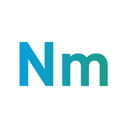Neometals (NMT) - Mercedes Expansion Shows Huge Growth Appetite
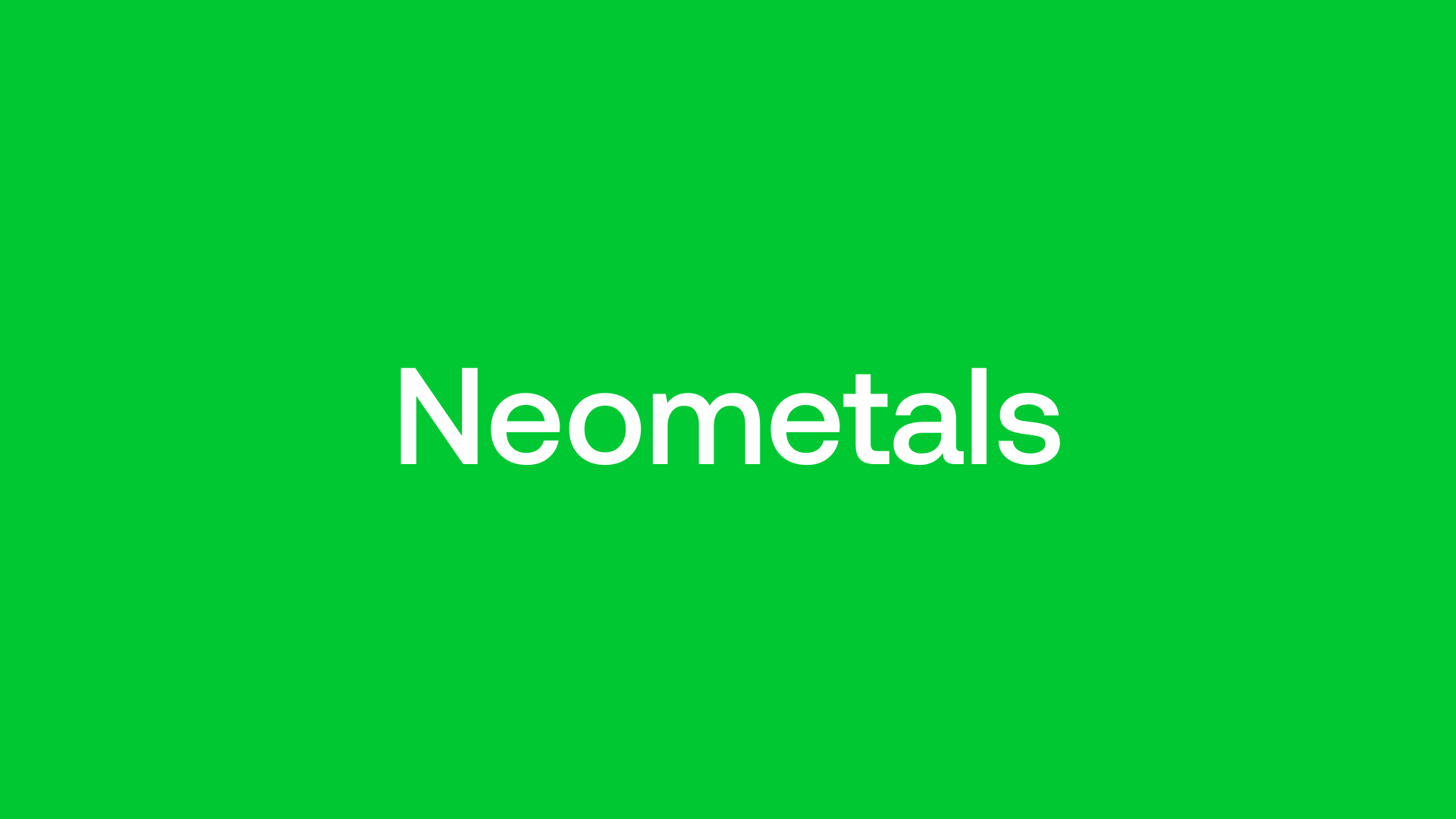
Interview with Chris Reed, Managing Director & CEO of Neometals Ltd. (ASX: NMT)
Neometals is a mineral and advanced material company involved in the recycling, and production of high-grade lithium and vanadium. The company was founded in 2001 and is headquartered in Australia. Alphamet Management Pty. Ltd, Mount Finnerty Pty. Ltd., Reed Advanced Material Pty. Ltd., Mt. Edwards Lithium Pty. Ltd., Barrambie Gas Pty Ltd., and Inneovation Pty. Ltd (formerly Australian Vanadium Exploration Pty. Ltd.), are the companies' subsidiaries.
Matt Gordon caught up with Christopher Reed, CEO and Managing Director, Neometals. Mr. Reed started his career in the mining industry in 1990 and co-founded Reed Resources in 2001. He is a member of the AusIMM (Australasian Institute of Mining and Metallurgy) and former Vice President of the Association of Mining & Exploration Companies. His educational background includes a Bachelor of Commerce degree from the University of Notre Dame, WA School of Mines.
Company Overview
Neometals is an innovative mineral and advanced materials company focused on a sustainable future. The company seeks to de-risk and develop long-life projects with strong integrated partnerships throughout the value chain. The company was founded in 2001 and is headquartered in Australia. It is listed on the Australian Stock Exchange (ASX: NMT) and the Alternative Investment Market of the London Stock Exchange (AIM: NMT).
Neometals is a technology developer focused on the continual improvement and commercialization of its innovative processing technologies to make greener battery materials.

The company has a long history in mining and is credited with developing the world’s second-largest hard rock lithium source. The company has been involved with industrial minerals and has always focused on downstream processing. It has developed new downstream processing technologies that have the potential to generate higher margins. The company has developed technologies in lithium processing, lithium battery recycling, and vanadium recovery from waste products. It also has a residual mining asset.
Developing these technologies has enabled Neometals to have a sustainable competitive advantage, which can be used to build businesses. It has partnered with SMS Group to develop lithium-ion battery recycling technology. The company has taken its vanadium recovery project through a Feasibility Study level of valuation with critical metals. It is commercialising the ELi technology with Reed Advanced Materials Pty Ltd, one of the top-50 companies listed on the ASX, and Bondalti Chemicals S.A., Portugal’s largest chemical company. Neometals continues to retain its hard rock titanium asset, which it has plans to develop with partners in the future.
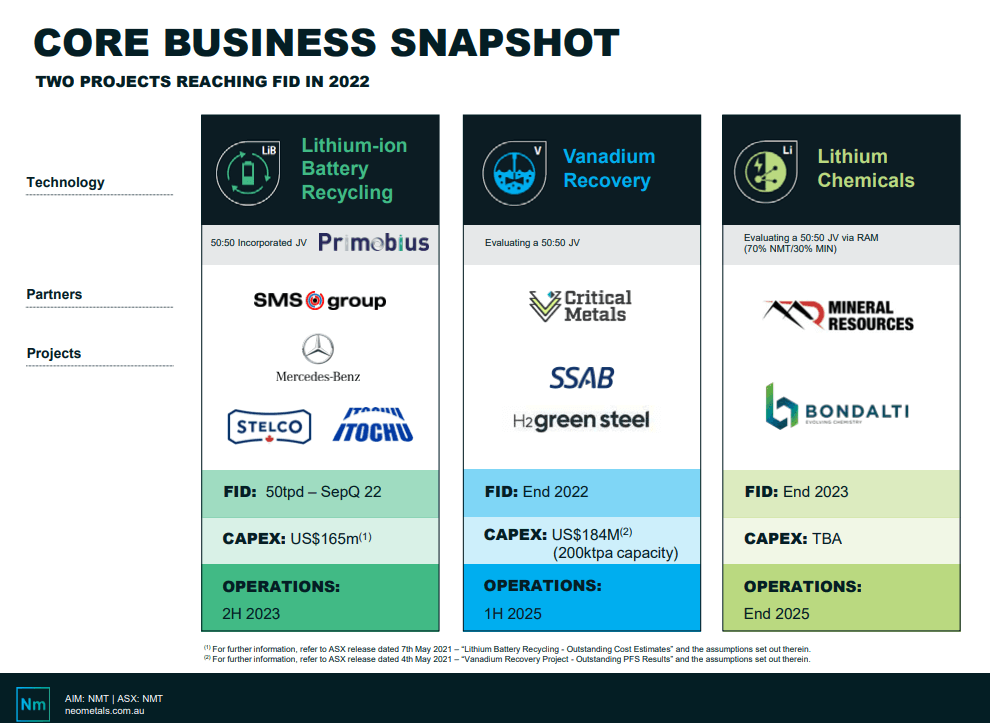
The Mercedes Joint Venture
Lithium-ion battery recycling is a megatrend disconnected from the geopolitical or general global economic malaise. All car makers are transitioning towards EVs (Electric Vehicles), and as a result, lithium has been largely unaffected by the current market. Neometals’ battery recycling enables the recovery of nickel, cobalt, and lithium at the bottom end of the cost curve with the lowest carbon footprint. The technology has been commercialised by the company for quite a few years now. The recycling technology has led Mercedes to pick Neometals as a partner.
In May 2022, Neometals entered a joint venture with SMS Group called Primobius to enter a binding agreement with LICULAR GmbH, a Mercedes-Benz subsidiary for developing a battery recycling plant. The agreement is a 5-year collaboration with Mercedes Benz for a battery recycling plant. Here, Neometals will supply Mercedes with a plant and impart training to Mercedes Benz’s staff on battery recycling. The company has received its first purchase order from Mercedes, making the cooperation agreement legally binding. Neometals is looking forward to a long and fruitful collaboration with one of the best car makers in the world.
As part of the agreement, Neometals will supply Mercedes with equipment supply agreements for a 10t a day or a 2,500t per annum recycling plan in Copenhagen, Germany. This plant will be used to recycle Mercedes Benz’s batteries.
As Mercedes is moving towards EVs, it will be manufacturing its own cells. The company already has a cell assembly in place. Neometals will be supplying the 10t/day of 2,500t/year plan royalty-free. Mercedes will be manufacturing millions of EVs over the years that would need recycling. Neometals will supply larger plants in the future and charge a royalty for the same. The 10t plant is the first step in a long-term collaboration.
Neometals has entered a joint venture with the SMS Group, a 150-year-old German plant builder. The JV is called Primobius and has 3 business models. Here, the company will act as a principal, sourcing cells from car makers and cell makers, breaking them down, and selling the products. Currently, the company has a maximum processing capacity of 10t a day.
The company is working on ramping up the production capacity in Hilchenbach, Germany. It is looking to build additional plants as it will enable success in the long run by capturing volume. The company is working with Stelco, a Canadian steel company to commercialise the technology in North America. Neometals has provided an interim technology licence to Stelco while retaining the option to buy 50% of the business. While the royalty drops to zero, the equity will go up by 50% in the business to develop integrated battery operations all around North America.
Through the binding agreements, Neometals has now successfully demonstrated to the market that they are in operation. All three business models aren’t expected to generate immediate cash flow. The company has moved from the supply chain to factor in actual customer reviews and provide material solutions. The battery materials business is key for the company. Its partnership model significantly increases the chances of success in achieving growth in business.
Neometals is focused on ensuring shareholder safety. It has a highly-experienced Board and Management Team. In the last 7 years, the company’s TSR (Total Shareholder Return) averaged 70%, notwithstanding the current market pullback. The company has a robust balance sheet with zero debt. In the previous quarter, Neometals had over 100 cash and investments. Over time, the investments are expected to go down and cash will be spent. Overall, the company is in a strong position.
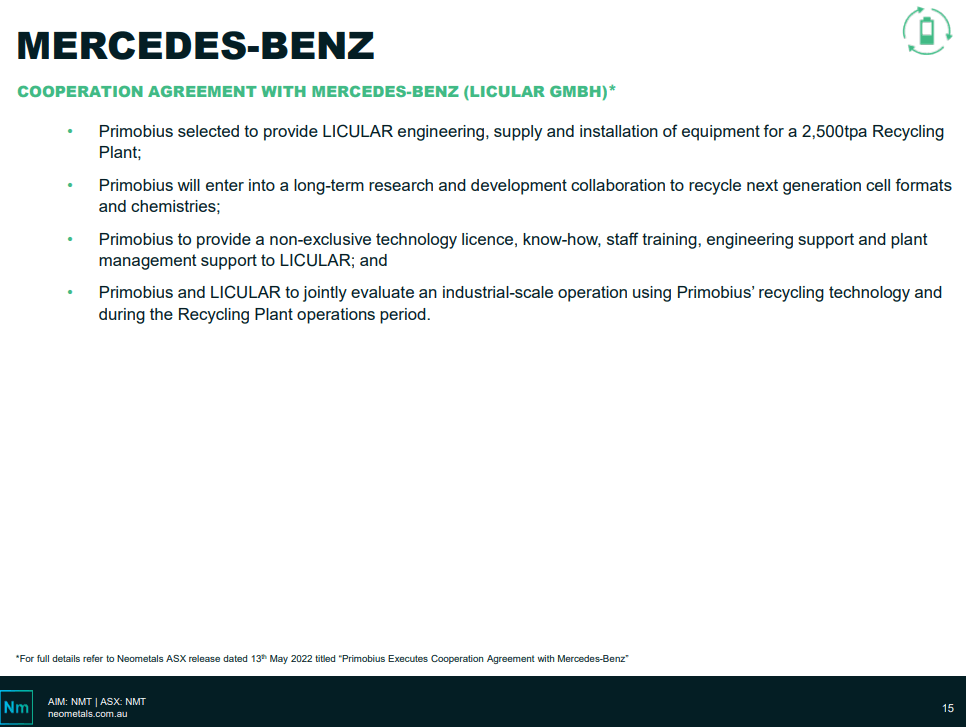
Recycling Plant Business Model
Neometals is a project developer and not a mining company. Due to this reason, it does not need to carry out different studies in order to finance and build the project. The company built a massive shredding section first, which is now operating on a commercial level. The refinery hub is currently in the demonstration phase, where the company is running customer trials. Mercedes, Neometals, and Stelco each have a 10t/day plant in the works.
The company’s team has been focused on delivering the front-end engineering on the three 10t plants ahead of the equipment supply contract. It is looking to enter into commercial agreements to supply plants in exchange for a price. Due to a lack of investment decisions, the refinery has been delayed by 6 months. Under the contractual obligations, the company is currently focused on delivering the plants to both Mercedes Benz and Stelco. Once delivered, the company will put out an Engineering Cost Study for the hub which is currently lower on the list of priorities.
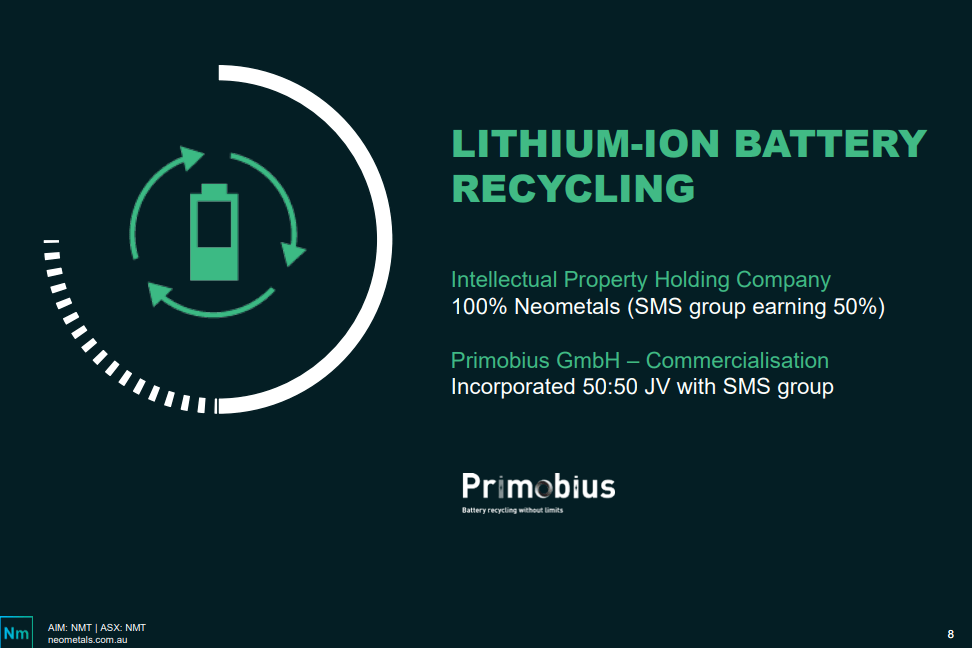
Stelco is the national steel producer in Canada. The company has been operating for 100 years. Notably, Stelco is one of the largest steel producers outside of China. It is listed on the Toronto Stock Exchange and has a $2.5Bn+ market cap. The company produces specialty steel which is predominantly used in automotive manufacturing.
Neometals’ contractual obligations with Mercedes Benz put the spoke plant before the hub. Going forward, the company is aiming at an optimal model with a number of spokes and a centralised hub. The company is focused on the business of selling plants. Primobius buying the plants from SMS would be the preferred route. The preferred route would be for Primobius to buy the plants from SMS. The plants can also be supplied through joint ventures where the company can utilise the technology access to increase the volumes. It is looking to source material from production scrap through to the larger end-of-life volumes in time.
Different customers have varying requirements. A car maker producing millions of vehicles would look to recycle millions of cars. In this scenario, the automaker would prefer to buy plants to conduct in-house recycling by paying a royalty. This business model would have the lowest recycling cost for the automaker.
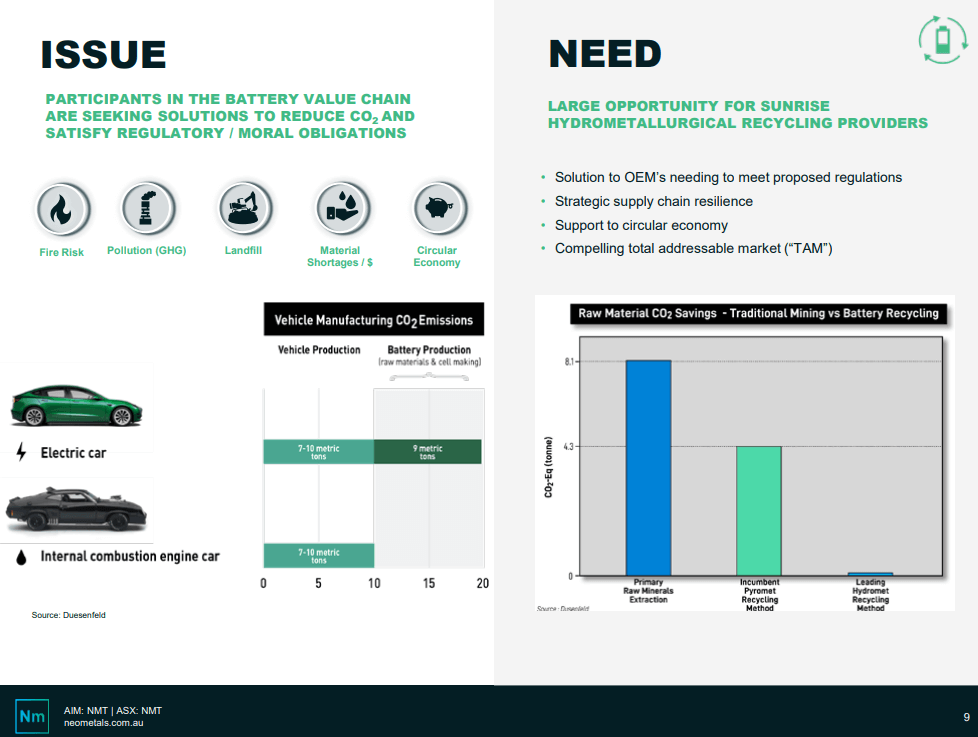
Funding Considerations
Neometals has already funded the Hilchenbach plant, which is expected to generate revenue at nameplate capacity. For Mercedes Benz, Neometals is looking to supply licensed plants. Since Mercedes will pay for the plant, Neometals would only need to deploy working capital. The Stelco 10t plant is being provided on a licence where Neometals has the option to buy in between 25%-50% into Stelco’s special purpose vehicle that will carry out the recycling. In a case where Primobius has a 50% equity, Neometals will have an equitable share of 25% of the capital costs.
The company envisaged in the early stages that it wouldn’t need debt-based funding. The company is looking at hydromet hubs as the larger bits along with the shedding spoke. The company would need to draw down equity before banks allow the drawing down of debt. Neometals will be producing cash from the plant’s front end. This is a low-risk strategy that is expected to fetch lower interest rates.
The company’s inflation rate over the next two weeks is expected at 7.1 instead of 9.1. The Board, Management, and stockholders are cognizant of this development. Neometals recently celebrated its 20-year anniversary on the Australian Stock Exchange, and it looks forward to celebrating the next 20 years.
While the company does have hurdles to develop the ideal project model, the battery plant negates these challenges. Funding the battery plants when needed will be its top priority. It has flexibility over the timing and structure.
In 2021, Neometals de-merged its nickel assets and returned it to the shareholders. The nickel assets have performed quite well so far. Widgie Nickel has strong future prospects. Notably, the company recently made a new discovery. As per Neometals, the discovery holes were some of the best in the Australian Nickel zone in the past decade.
Neometals is cognizant of the investment decisions coming up in the near future. It will prioritise the battery business requirements above all else as it offers the quickest payback. With the recycling plants, the company has taken a cookie-cutter approach. SMS has 14,500 employees across 95 sites around the world, which gives it the ability to build multiple plants simultaneously. The company also has manufacturing operations across most continents. Neometals has a fantastic pipeline of future projects, where it is looking to roll out plants in Europe, North America, and Asia.
Based on the previous studies conducted on battery recycling, the company has a payback timeline of 2-3 years which is quite rapid and has the potential to generate double-digit IRRs (Internal Rate of Return). The company has the capability to build ten 50t plants over the next 2 years that can take production scrap from a Gigafactory, accounting for 10% of the supply. The other 90% supply will come in the form of cars.
At the end of life, the company will have a 50t shredding operation, and a 50t spoke. Once these plants are built and deployed, the company will move on to 500t shredders and spokes. These plants can have an even larger capacity based on customer requirements. For the company, the biggest bottleneck at this point is to build enough plants to capture the desired market share. Partnering with a global plant builder is the only way to achieve this target.
Neometals does not need to issue the hydromet purchase supply agreements until 2023. In the meantime, the company is focused on conducting class 3 studies while simultaneously delivering the plant supply agreements for Mercedes Benz and Stelco in December. One of the plants has a royalty-free licence for a 10t/day operation, while the other one has a 14% royalty for a 50t/day operation.
Interestingly, Mercedes Benz does not have an exclusive contract with Neometals. The German government has invested €17M, while Neometals will be supplying the plant. Mercedes Benz, Daimler, and Neometals along with three technical universities are entering a 5-year collaboration for the development of a recycling facility and an R&D (Research and Development) collaboration. This arrangement includes discharge, dismantling of the shedding facility, the hydromet, transportation, permitting, artificial intelligence, and more.
As part of the Primobius joint venture, SMS and Neometals personnel will be present at the facility. The improvements generated in the collaboration will be co-owned, ensuring that the developed technology is consistently at its peak. Neometals has put together a team of highly-skilled engineers to work on the plants.
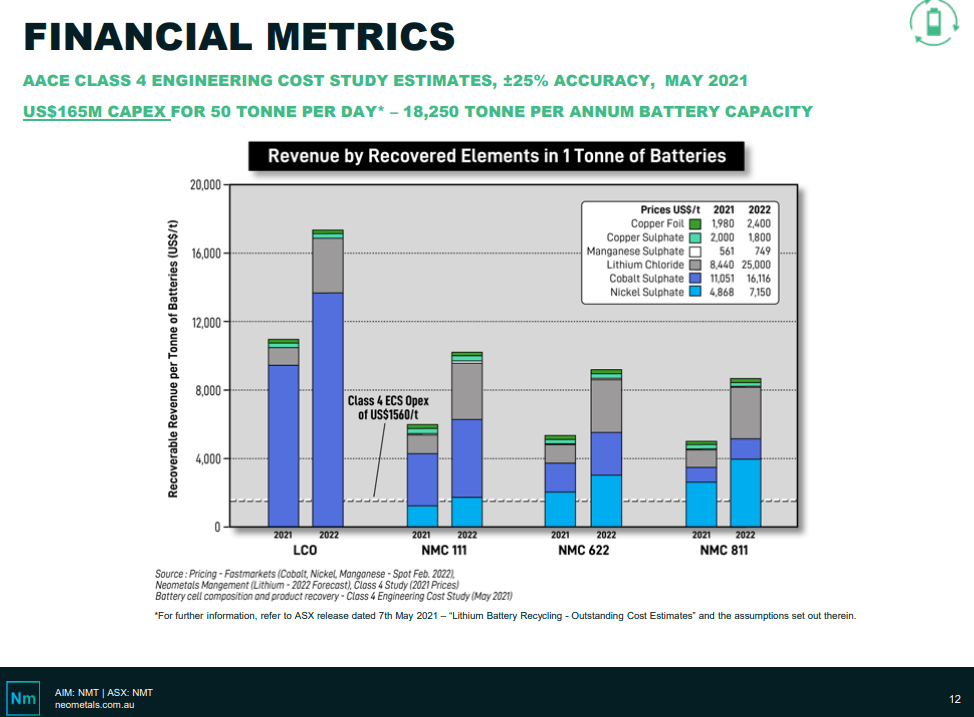
The Vanadium Recovery Project
For the vanadium recovery project, Neometals has tested a variety of slag grades. The company has a dedicated team that is working on the vanadium recovery project in a separate part of the office. It has already completed the pilot plant along with the engineering studies. The results from the pilot plant were as per the company’s expectations. It is set to become the lowest quartile cost producer of vanadium. Notably, the cost calculation excluded the captured carbon credits. The business model is structured to generate royalties from by-products.
Neometals has de-risked the project from a technical standpoint. As the company was finishing up the studies in the last quarter, the Russia-Ukraine conflict caused a high inflation environment, leading to significant changes in nickel, copper, vanadium, iron ore, and petroleum prices. While the technical risk has reduced, the financial risk has increased. Ideally, the company would currently be in the final stages of sourcing additional SSAB slag material for a larger capacity plant. In case the material cannot be sourced, the company will report back to the original plant size.
In order to fulfil its obligations, the company is looking to acquire debt financing and line up equity. It is flexible in terms of the funding vehicle. The company has an option to take 50% equity and licence its own technology into the project. Essentially, the company has rights but no obligation in terms of contingent liabilities associated with the project. This parameter was a part of the project from the very start.
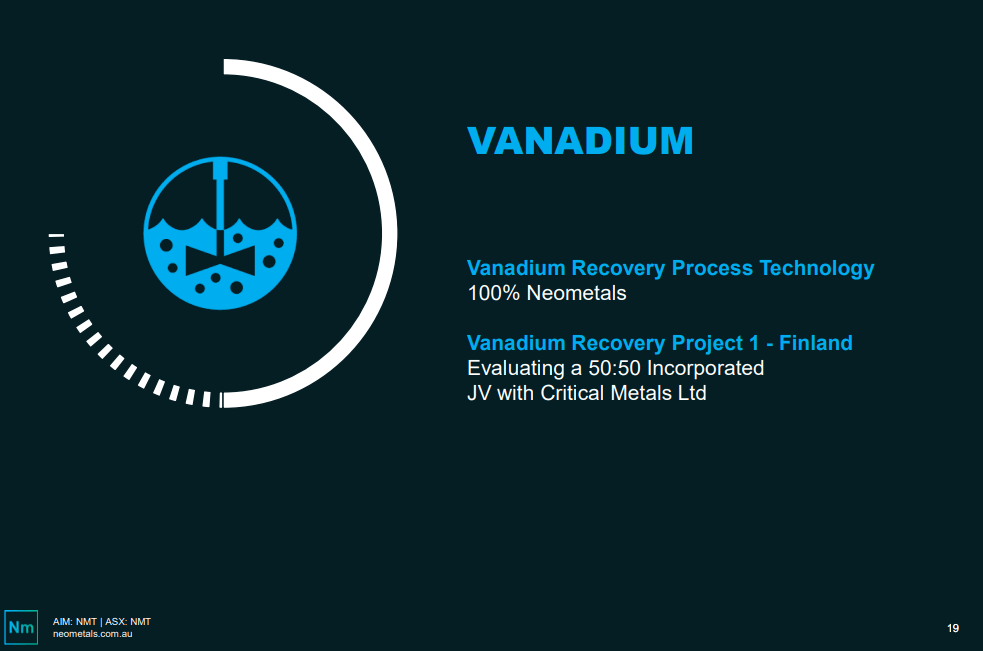
Since prices have come off, the company is facing an investment decision to initiate the supply agreement with SSAB by making pre-payments for the slag and start taking deliveries. The company has optionality to start the construction of the processing plant over the next 6 months. Since it isn’t under any obligations, the company can form a joint venture and take 50% equity, by including technology licensing and contributing to the project finance.
The project cost is estimated at $340M. The company is considering bringing down the production from 300,000t to 200,000t. The vanadium recovery project will generate high-purity vanadium with zero carbon footprint from waster sequestering carbon in Europe. 80% of the material’s demand is linked to global steel production. Vanadium batteries are yet to reach the required maturity that would trigger a surge in demand.
Neometals has to make a decision on the SSAB slags, make prepayments, and start deliveries by 31st December 2022. In a case where debt financing is unavailable, the company can acquire equity either through the head company or a special purpose vehicle.
SSAB has been generating slags for the past 40 years, while H2 Green Steel has plans to start generating slag over the next 2 years. Neometals has the flexibility to source slag from third-party providers. Given the current geopolitical environment, the company and its partners would feel much more comfortable if Finland becomes a NATO (North Atlantic Treaty Organization) member.
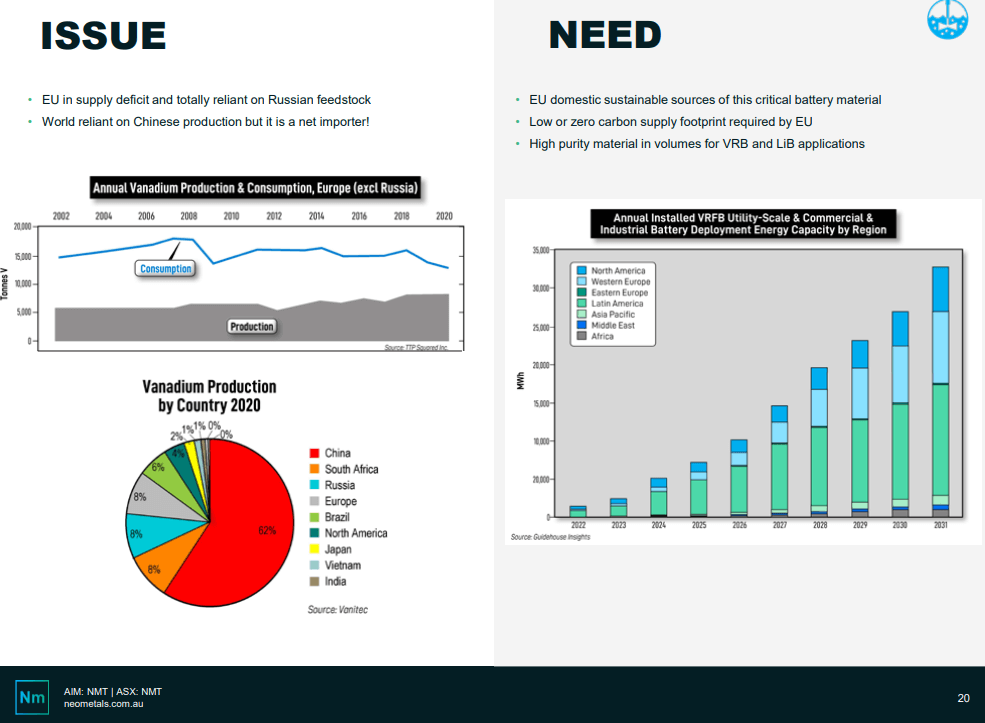
The Barrambie Titanium Vanadium Project
Neometals has already sent samples from the Barrambie project in China, and commercial smelting trials are expected to begin shortly. The prices of ilmenite have been highly favourable over the past 5 years. There is a global shortage of chloride-grade feedstocks and the need for smelting has driven up the material prices. The genuine step change in downwards supply has also led to an increase in prices.
For the Barrambie project, the company has strong EOIs (Expression of Interest) from contractors looking to participate on both a contractual level and through ownership structures. Neometals is looking to conduct gravity separation and sell the material to China. As a second horizon, the company is also considering downstream processing into ilmenite in Australia. The non-magnetic fraction or ilmenite can be sold for really good prices. The company also has experience with the magnetic fraction, the vanadium-bearing concentrate. The Barrambie Titanium Vanadium Project is the world’s second highest-grade hard rock titanium deposit. The project is moving close to development each day.
The vanadium recovery project with Bondalti is moving along as per expectations. Neometals is currently working on a class 3 engineering cost study. It is looking to order the pilot plant in the next 6 months to get it ready for operation by the end of 2023.
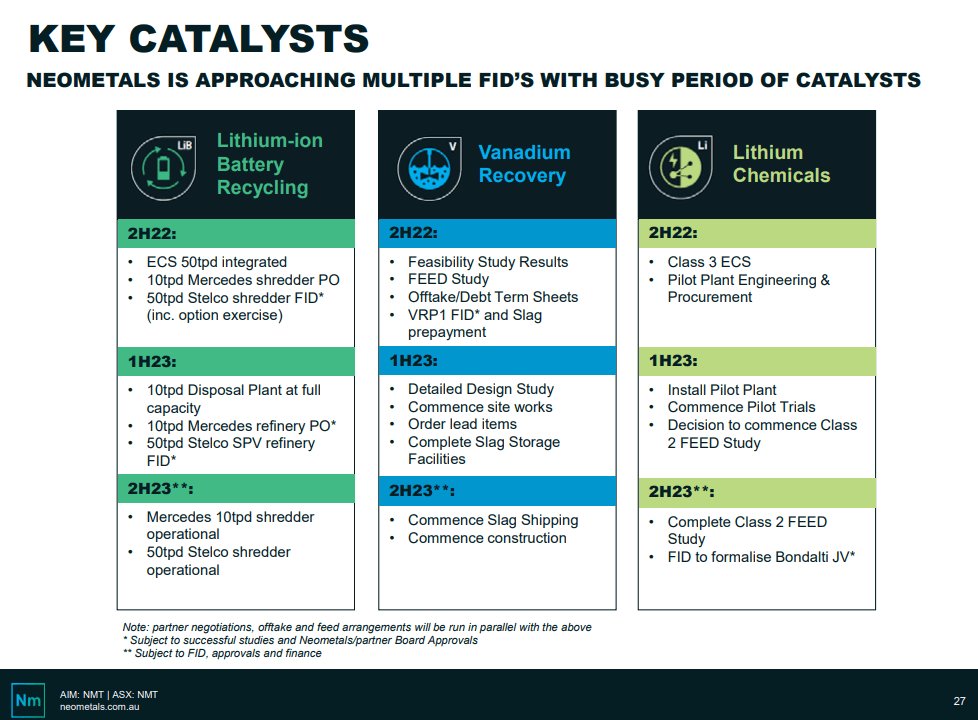
To find out more, go to the Neometals website
Analyst's Notes




Subscribe to Our Channel
Stay Informed










